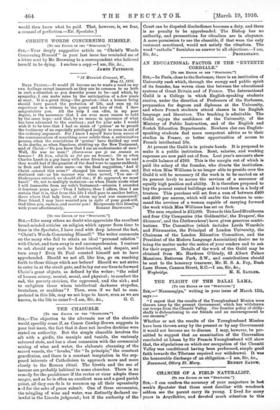CHRIST'S WORDS CONCERNING HIMSELF.
[To THE EDITOR OP THE " SPECTATOR."] SIR,—Your deeply suggestive article on " Christ's Words Concerning Himself " in your last issue has reminded me of a letter sent by Mr. Browning to a correspondent who believed herself to be dying. I enclose a copy.—I am, Sir, &c.,
JAMES PATERSON.
"19 Marwick Crescent, W., May 11, 1876. DEAR FEIEND,—It would ill become me to waste a word on my own feelings except inasmuch as they can be common to us both in such a situation as you describe yours to be—and which, by sympathy, I can make mind by the anticipation of a .few years at most. It is a great thing—the greatest—that a human being should have passed the probation of life, and sum up its experience in a witness to the power and love of God. I dare congratulate you. All the help I can offer, in my poor degree, is the assurance that I see ever more reason to hold by the same hope—and that, by no means in ignorance of what has been advanced to the contrary ; and for your sake I would wish it to be true that I had so much of genius' as to permit the testimony of an especially privileged insight to come in aid of the ordinary argument. For I know I myself have been aware of the communication of something more subtle than a ratiocinative process, when the convictions of 'genius' have thrilled my soul to its depths, as when Napoleon, shutting up the New Testament, said of Christ—' Do you know that I am an understander of men ? Well, He was no man!' (Savez-vous que je me connais en hornmes? Eh biers, as Jut pas un homme). Or as when Charles Lamb in a gay fancy with some friends as to how be and they would feel if the greatest of the dead were to appear suddenly in flesh and blood once more—on the final suggestion, ' And if Christ entered this room ?' changed his manner at once, and stuttered out—as his manner was when moved, You see—if Shakespeare entered, we should all rise ; if He appeared, we must kneel.' Or, not to multiply instances—as when Dante wrote what I will transcribe from my wife's Testament—wherein I recorded it fourteen years ago—' Thus I believe, thus I affirm, thus I am certain that it is, that from this life I shall pass to another better, there where that lady lives, of whom my soul was enamoured.' Dear friend, I may have wearied you in spite of your good-will. God bless you, sustain, and receive you! Reciprocate this blessing with yours affectionately, ROBERT BROWNING?'










































 Previous page
Previous page